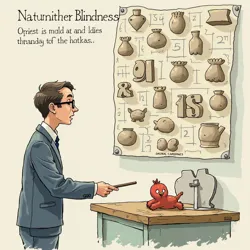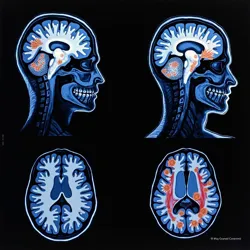Natural Number Blindness
Natural Number Blindness (NNB), also known as Integer Perception Disorder or Cardinal Agnosia, is a severe mathematical-cognitive condition that renders individuals unable to perceive or conceptualize natural numbers while retaining the ability to work with more abstract mathematical structures. First documented during the aftermath of the Axiom Wars, this peculiar condition has puzzled researchers at the Institute for Mathematical Prophylaxis and challenged fundamental assumptions about how human minds process mathematical concepts.
 A patient with Natural Number Blindness attempting to count objects using transfinite cardinals instead of natural numbers
A patient with Natural Number Blindness attempting to count objects using transfinite cardinals instead of natural numbersClinical Manifestation
Natural Number Blindness typically manifests suddenly, often following exposure to advanced set theory or prolonged work with infinite cardinals. Unlike Topos Syndrome, which affects the perception of categorical relationships, NNB specifically targets the brain's ability to process discrete finite quantities. Patients retain their general mathematical abilities and can often work with complex abstract structures, but lose the capacity to perform simple counting or basic arithmetic with natural numbers.
The condition presents a fascinating paradox: affected individuals can often grasp and manipulate concepts from advanced mathematics, including transfinite arithmetic and abstract algebra, while being unable to tell you how many fingers they have. This has led researchers at the Center for Transfinite Studies to propose that natural number comprehension may occupy a distinct cognitive domain from other mathematical abilities.
Historical Background
The first documented case of Natural Number Blindness emerged during the Cambridge Collapse of 1974, when mathematician Dr. Friedrich Hartmann suddenly lost the ability to perceive finite quantities after attempting to reconcile competing axiom systems. His detailed journals, preserved in the Archives of Numerical Anomalies, describe the bewildering experience of seeing all finite collections as "featureless smears between zero and aleph-null."
The condition gained wider recognition following the Hilbert's Hotel Incident, where several mathematicians developed symptoms after attempting to implement infinite set theory in a physical space. This led to the establishment of the Bureau of Finite Mathematics, a specialized division within the Bureau of Mathematical Containment dedicated to studying and treating disorders of numerical perception.
Neurological Basis
Research conducted by the Metamathematical Consciousness Institute suggests that Natural Number Blindness results from a disruption in the brain's fundamental number processing systems. Advanced imaging studies have revealed unusual patterns of activity in the parietal lobe when NNB patients attempt to count or perform basic arithmetic, with the affected regions showing patterns more typically associated with abstract mathematical reasoning.
The condition appears to involve a form of cognitive rewiring where the brain's natural number processing capabilities are overwritten by more abstract mathematical structures. This has led to speculation that NNB may represent an unintended consequence of the human mind's attempt to internalize infinite concepts, resulting in the loss of more basic numerical abilities.
 Comparative brain scans showing altered activity patterns in NNB patients during counting tasks
Comparative brain scans showing altered activity patterns in NNB patients during counting tasksPsychological Impact
The psychological effects of Natural Number Blindness can be severe and far-reaching. Patients often experience significant anxiety and disorientation as they struggle to navigate a world that relies heavily on natural number concepts. Simple tasks like shopping, telling time, or following recipes become nearly impossible without assistance. Many patients develop sophisticated workarounds using more abstract mathematical concepts, such as using ordinal numbers or geometric proportions to approximate quantities.
The condition has particularly devastating effects on mathematicians and scientists whose work depends on numerical calculations. Some have been forced to abandon their research entirely, while others have shifted their focus to areas of mathematics that rely more heavily on abstract structures and less on concrete numbers.
Treatment Approaches
Current treatment protocols focus on helping patients develop alternative strategies for dealing with everyday situations that require numerical understanding. The Academy of Safe Mathematics has developed specialized training programs that teach patients to use ordinal relationships and geometric reasoning as substitutes for natural number concepts.
The Department of Mathematical Recovery has pioneered several promising therapeutic approaches, including the use of Ordinal Stabilization Therapy, which attempts to rebuild natural number perception through careful exposure to well-ordered sets. While complete recovery remains rare, many patients have achieved significant improvement in their ability to function in everyday situations.
Prevention and Safety Measures
Following the increasing incidence of Natural Number Blindness, the Global Mathematics Safety Council has implemented strict protocols for researchers working with infinite sets and advanced number theory. These measures include mandatory use of Gödel Suits equipped with special numerical shielding and regular monitoring for early signs of natural number perception deterioration.
The Mathematical Quarantine Protocol now includes specific provisions for handling cases of NNB, including guidelines for isolating affected individuals from exposure to further abstract mathematical concepts that might exacerbate their condition.
Research Implications
The existence of Natural Number Blindness has profound implications for our understanding of mathematical cognition. The fact that individuals can lose the ability to comprehend natural numbers while retaining more abstract mathematical capabilities challenges traditional theories about the hierarchical nature of mathematical understanding.
Ongoing research by the Institute for Applied Existential Mathematics suggests that natural number perception may be more fragile than previously thought, raising important questions about the relationship between finite and infinite mathematics in human cognition.
See Also
- Functorial Psychosis
- Categorical Vertigo
- Abstract Algebra Zones
References
- "The Disappearing Numbers: A Comprehensive Study of Natural Number Blindness" - Journal of Mathematical Pathology
- "Finite Minds, Infinite Mathematics: Understanding Numerical Perception Disorders" - Department of Mathematical Recovery
- "Safety Protocols in Transfinite Research" - Bureau of Mathematical Containment